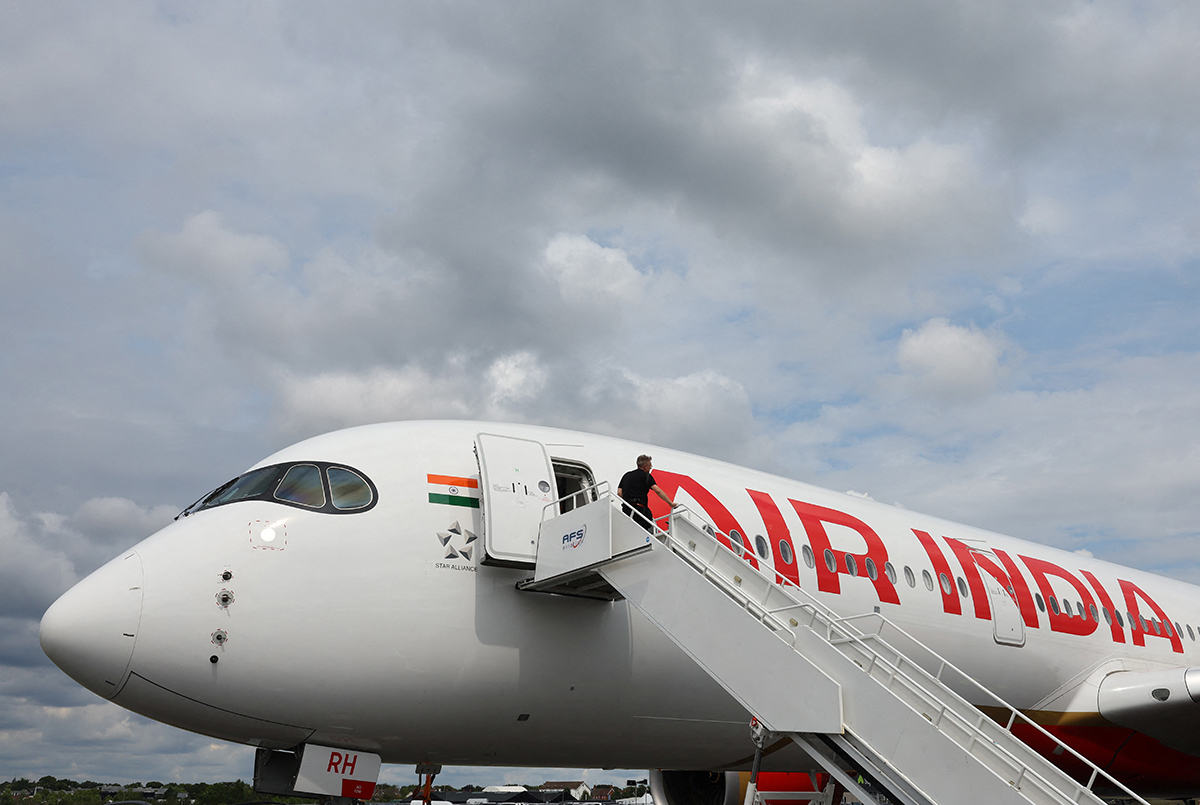In the international skies too, the Tatas have made an impressive increase in their seat capacity, which is up by 21 per cent from 18.15 million in CY23 to 21.96 million in CY24.
Photograph: Toby Melville/Reuters
The Tatas have collectively increased their aggregate airlines seat capacity across domestic and international markets by an impressive 20 per cent, going from 64.03 million in calendar year (CY) 2023 to 76.72 million in the current CY, according to data shared by the group that controls Air India in which Vistara has been merged recently.
The Tatas also run Air India Express in which Air Asia India has been merged.
According to data from the Tatas, the group has seen its aggregate domestic passenger seat capacity go up by 19 per cent from 45.88 million in CY23 to 54.76 million in CY24.
This accounts for an over 28 per cent of the total aggregate domestic seat capacity across airlines.
In CY23, it accounted for 25 per cent of aggregate capacity of all airlines.
In the international skies too, the Tatas have made an impressive increase in their seat capacity, which is up by 21 per cent from 18.15 million in CY23 to 21.96 million in CY24.
Yet the home truth is that in the domestic skies, despite the sharp increase in capacity, the Tatas have still a long way to go even to reach half of the seat capacity of rival IndiGo.
According to Cirium, the world’s most trusted source of aviation analytics, the group will end the year with 119 million seats, a growth of over 9 per cent over last year, despite the high customer base.
But the good news is that despite teething problems, which still continue, the Tatas flagship carrier Air India has seen an over 39 per cent increase in its seat capacity this CY (without adding Vistara, which has been calculated separately), with 23.5 million seats on offer, according to Cirium.
Clearly, the growth in IndiGo, Tata group airlines, and Akasa (the new kid on the block, which quietly increased seat capacity by over 20 per cent in CY24 over last year) has helped India to end the year with a domestic seat capacity growth of 6.84 per cent, having an aggregate capacity of 193.5 million seats over CY23, according to Cirium.
And, this is despite the fact that Go First had no operations and SpiceJet and Alliance Air had reduced seat capacity.
In the same period, the number of scheduled flights has increased by 5.4 per cent at 1.13 million.
And, the total available seat kilometres (ASKs) that all the airlines will fly has gone up by 7.33 per cent in CY24.
In terms of passenger seat capacity, the Delhi-Mumbai (both sides) segment saw an increase of 8.2 per cent in CY24 over last year, with 7.9 million seats on offer.
The Mumbai-Kolkata segment showed an impressive increase in seat capacity of 15 per cent in the same period, racing to 2.3 million seats. However, seat capacity increase on the Mumbai-Bengaluru route remained stagnant while that between Delhi-Kolkata saw a marginal increase of over 2 per cent.




